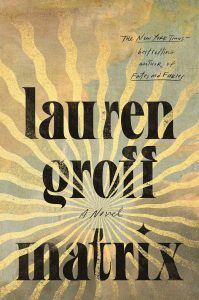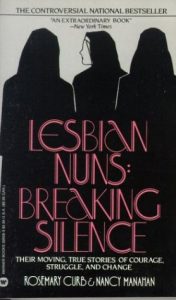Amazon Affiliate Link | Bookshop.org Affiliate Link
In the backdrop of the glamorous life of Eleanor of Aquitaine, Matrix follows 17-year-old Marie, who is unwanted at court for her bastardy, her height and rough-hewn appearance, and her scandalous family history of women crusaders and warriors. Deeply in love (and lust) with Queen Eleanor, Marie is shocked to find herself shipped off to a dilapidated abbey in England as its new prioress, despite having no vocation. Nominally historical fiction, Matrix only vaguely concerns itself with documented historical events, rather focusing on the space women can build for themselves when they have the space to do so and the relationships they had with either other, from queer to contentious and everything in between.
The abbey Marie is consigned to is impoverished, the nuns are diminishing in number and beset by disease, and the local gentry and peasants are refusing to pay their rents and stealing abbey land. The abbess is vague and frequently lost in the depths of her own mind, the other sisters in charge are frequently cruel or inefficient, and Marie has no interest in becoming a part of the community or taking any real leadership. Instead, she frequently writes to Eleanor, letters and religious poetry, hoping that Eleanor will think fondly of her and bring her back at court. It’s only as the years pass and she realizes that Eleanor will never return her affections that Marie turns her mind to taking up the reins of abbey leadership, and once she does Marie, trained to run a noble estate, builds her abbey from a pit of disease and starvation to a bustling and powerful community of religious women and herself into a towering religious power who takes more authority on herself than the church would normally allow.
The sensuality embedded in Marie’s story is both commonplace and shocking. Early on, while Marie is still at court, we learn that she has had a sexual relationship with her maidservant Cecily – and that her regard for Eleanor isn’t purely platonic – but it’s unclear whether Marie regards these encounters are “real sex” or more along the lines of physical things that just happen since it’s presented so matter-of-factly – nothing to see here, just medieval gals being pals. This is both reinforced and complicated by her relief when, years later at the abbey, the sister in charge of the abbey infirmary invites her to come by for regular orgasms as a way of “rebalancing the humours” and categorizes it as a simple physical thing that some people need to have. Relief because she has scoured religious texts for “female sodomy” and found nothing – indicating that she has an inkling her sexual encounters would not be as acceptable to wider society but her quick acceptance of an explanation – and the continuing circle of physical relationships among the sisters – indicates that no one intends to give up such acts or feel guilt over them. Indeed, none of the conflict in the story was about the simple existence of such relationships, and it seems like the community built by the women has a strong tradition of close relationships between sisters.
Matrix is outside of my usual reads, because I don’t normally long to read about the Catholic Church, but I really enjoyed how this book blended historical figures with beautiful imagery, and how it played with the line between sensuality and practicality. It’s not a typical historical fiction book, but it is eminently readable and enjoyable. I enjoyed the idea and the slow rise of women building a base of protection and power for themselves in an area where their options were limited and without much influence. I enjoyed Marie’s slow turn from pining for Eleanor to determination and skill to take the situation she was given and make it better, and her increasing desire to make it a community by women for women, with fewer and fewer men allowed on the grounds for any reason. The resulting community is flawed and prosperous and queer and strong and rather engaging to read about. A good rec if you want a little something different in your to-read list.



